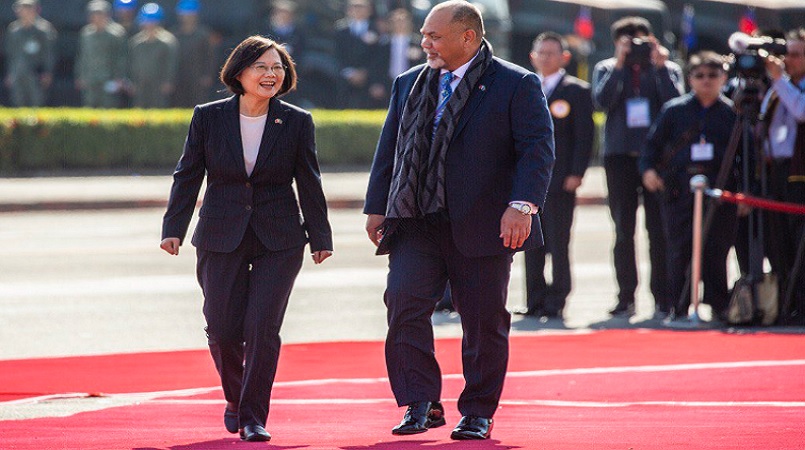
Nauru President Lionel Aingimea, who is currently in Taiwan for his first foreign visit after assuming office in August, reaffirmed Nauru-Taiwan relations on Saturday amid ongoing Chinese expansion in the South Pacific region.
Aingimea arrived in Taiwan on Friday for a five-day state visit, his third to Taiwan and first as president.
In an exclusive interview with the CNA on Saturday, Aingimea said bilateral relations are significant and reiterated that he sees Taiwan as family, which he also told Taiwan's President Tsai Ing-wen during a welcome banquet Friday.
"When you start using words like family, it takes it up to a different level, a level that ensures that when things happen within family, family sticks together," Aingimea said.
He also stressed that Nauru-Taiwan relations are not limited to development but also include a personal element, citing as an example Nauruan students who study in Taiwan and bring Taiwanese culture and customs with them when they return home.
He went on to enumerate Taiwan's assistance to Nauru in education, police matters, agriculture and fisheries, renewable energy, as well as Taiwan's contribution to the Intergenerational Trust Fund established in 2015 by several regional partners.
Aingimea's visit comes at a time when Beijing is expanding its sphere of influence in the strategic South Pacific region. In September, Beijing successfully poached the Solomon Islands and Kiribati from Taiwan, leaving the nation with only four diplomatic allies in the region -- Marshall Islands, Nauru, Palau and Tuvalu.
Answering reporter's question, Aingimea said China has not attempted to pressure Nauru to switch diplomatic relations, probably because Beijing knows Nauru's political stance and realizes it would be a wasted effort to approach Nauru on that issue.
"We are concerned about China's increased presence in the Pacific. We reject the 'One China principle' and the 'one country, two systems framework' and recognize that Taiwan is a sovereign and independent nation," he said.
Aingimea welcomed a proposal by Tuvaluan foreign minister Simon Kofe when he visited Taiwan in November, to form a coalition that supports Taiwan against China's suppression.
Australia and New Zealand have taken steps to counter China's expansionist strategy in the South Pacific, with initiatives such as "Pacific Step-up" and "Pacific Reset," and the United States will hold a meeting with its allies next year for relevant discussions, Aingimea said.
In an effort to counter China's dollar diplomacy, the three traditional partners also increased assistance to Nauru, Aingimea said, as he clarified that currently there are no Beijing funded infrastructure projects in Nauru.
However, a new port is being constructed in the country by a Chinese company, he said, adding that it is an Asian Development Bank project and the Chinese company won the bid.
Nauru will need Taiwan's expertise to operate the port when it is completed, so Nauru's economy can diversify from its heavy reliance on fishing and phosphate mining, Aingimea said.
On a lighter topic, Aingimea, who tried a mild form of stinky tofu -- a Taiwanese street food renowned for its strong odor -- at Friday's state banquet, vowed to try the "real thing" at a Taiwanese night market one day.
Asked by reporters to describe the taste of stinky tofu, Aingimea replied with a laugh "the name stinky tofu is perfect for it," he said.
Photo Twitter/President Tsai Ing-wen
